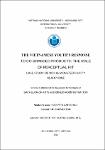| dc.description.abstract | The purpose of this study is evaluating the Vietnamese youth’s response to co-branded products in the role of perceived fit, particularly in the case of Nokia Monster Purity headphone. The research aims to explore the relationship between attitude of young customers towards co-branded products and the perceptual fit between two partner brands in Vietnamese context. Furthermore, it also tends to measure the spill-over effects and subsequent impacts of co-branding strategy in brand alliances.
According to literature review, the previous attitudes towards collaborated brands and their perceived fit take the key role in the success of a co-branded product. Moreover, the spill-over effect is also proved as weaker brands would be more beneficial than stronger brands in co-branding. Last of all, the favorable value of partner brands from co-branded product is measured by the post attitudes of customers towards their brands.
Regarding to methodology, the research is conducted by quantitative methods with the target respondent as the Vietnamese youth in the age group of 18-35. For this method, the sample size collected is 300 using the nonprobability sampling procedures. After collecting data, two software techniques SPPS and AMOS are used to analyze the findings.
The final findings of the research indicates that there is the significant relationship among attitude towards co-branded products and perceptual fit among partner brands. Besides that, the subsequent effect of co-branding is determined by its positive impacts on the intention to consume of young customers towards host brand and co-branded product. The certain role of prior perception among co-operated brands on their perceived fit is also clarified. However, the spill-over effect of Nokia Monster Purity headphone in the context of Vietnam is not confirmed in the research due to the rejection of hypotheses H4 and H9, which means the Nokia host brand is the stronger brand in this alliance and gain more benefit from the co-branded product than Monster – the invited brand. | en_US |


